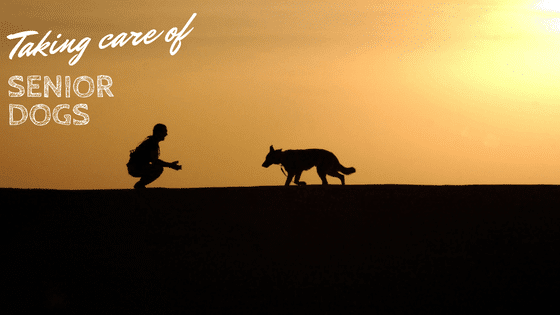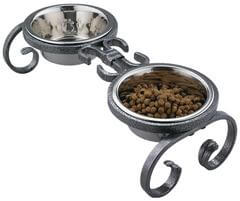
Ever wonder how it feels like yesterday when you think of that autumn evening you brought the little fur ball home?
The thing about time is it hits you when you aren’t looking. There you are on a joyful evening walk and you notice that slight limp with which your pooch is treading the path. Or it might be in the sudden realization that your dog can no longer climb the stairs with his trademark frantic pace.
Where did the time go?
As your dog enters his golden years, you know that the inevitable departure is creeping in, closer by the day. As a dog ages, he may start to have less energy, might develop ailments like cataracts or arthritis, but you know you won’t submit to the claws of ageing. You will look after him like he has looked out for you through the hiccups and highs of life.
How to Know When Your Dog is a Senior?
Unlike humans with a set “retirement age,” there’s no single number that defines a “senior dog.” It all depends on your furry friend’s breed! Smaller pups, like Chihuahuas and Toy Poodles, tend to reach their golden years between 8-11, while giants like Great Danes become seniors as early as 6-7.
Confused? Here’s a handy guide by size:
Tiny Tots (Under 20 lbs): These little firecrackers (think Pomeranians and Pugs) often become seniors at 8-11 years old.
Mighty Middles (20-50 lbs): Medium breeds like Terriers and Shepherds typically hit seniority between 8-10 years.
Big Buddies (50-100 lbs): Golden Retrievers and Labradors? Seniority starts knocking around 8-9 years.
Gentle Giants (Over 100 lbs): Those majestic Great Danes? Believe it or not, they become seniors by 6-7 years old.
Understanding the needs of older dogs
Like people, dogs also show signs of ageing. From grey hair to low energy levels. Larger dogs typically age faster than smaller dogs. Senior dogs get more sensitive to extreme temperature changes because of changes in their metabolism. Similarly, you need to moderate exercise for older dogs, as their respiratory functions and joints deteriorate with time.
You may also check with your vet if your dog appears to be overweight because the extra weight may affect your dog’s joint health.
An old dog with cataract may have trouble jumping on the bed, try if you can have a doggy ramp or provide soft bedding.
Tips to take care of senior dogs
Senior dogs have different care requirements than adult dogs and puppies. And, in order to provide the best possible senior dog care, you will have to do things a little bit differently in order to keep them healthy.
1. Feed your senior dog what his body needs
As dogs’ age, their metabolism turns a tad slower and they need less caloric energy. If you feed an old dog the same diet like that of a grown-up dog, it may deposit as excess fat on his body leading to arthritis or diabetes.
Consider a special diet (in consultation with your vet) if your older dog has heart or kidney disease. A low sodium diet is advocated for dogs with heart disease, while diets which help control phosphorus, calcium and other electrolyte levels are given to dogs with kidney disease.
As our cherished canine companions age, their nutritional needs shift. Gone are the days of puppy chow! To keep your senior dog thriving, a specially formulated diet is key. Here’s what to look for:
Power Up with Protein: Protein is the building block of a healthy body, and senior dogs actually need more of it than their younger counterparts. Opt for minimally processed, meat-rich dog food to ensure maximum nutrient absorption.
Trim the Fat and Carbs: An aging dog’s metabolism slows down, making them less efficient at burning calories. Lower-fat, lower-carb formulas help maintain a healthy weight and avoid unnecessary strain on their joints.
Fiber for a Happy Gut: Senior dogs may experience digestive difficulties. Look for a diet rich in fiber, often found in vegetables, which promotes healthy digestion and feeds good gut bacteria.
Antioxidant & Fatty Acid Boost: Omega-3 and Omega-6 fatty acids are powerful allies. They can reduce inflammation, support the immune system, and keep your senior dog fighting fit.
Picky Eater Solutions: Reduced appetite is a common concern with senior dogs. If your furry friend refuses to eat, don’t despair! Consult your veterinarian – they can recommend specific dietary solutions tailored to your dog’s unique needs.
By prioritizing proper nutrition, you can set your senior dog up for a happy, healthy golden age!
Give your dog easily digestible food which will help nourish his ageing body. Sometimes you might have to give your dog supplements like Omega fatty acids to help support bone, joint, heart, and brain health. Consult your vet for the same.
2. Your ageing dog needs exercise too!
While your dog may no longer run wild like he used to, it doesn’t mean he should be relegated to a quiet corner of the house. Exercise helps stimulate your dog physically and mentally. Engaging your dog in leisurely walks, swim or in one of his favorite games will help him get his daily dose of exercise. Keeping your senior dog mentally stimulated is key to their well-being.
Engage their brains with new tricks like “clean up” where they put away toys, or “hide and seek” where they sniff out hidden treasures. Even a simple bedtime routine of “tucking in” can be a fun and rewarding challenge. Don’t forget the power of new experiences! Bring your senior pup along on safe outings to keep their minds and spirits young. Remember to prioritize their comfort and rest for a happy adventure together.
If your dog has back issues—you may want to limit exercises which call for jumping.

Keeping walks enjoyable for your senior dog requires a bit of extra care. As their bodies age, they become more sensitive to temperature extremes. So bundle them up on chilly mornings and avoid the midday heat. Distance is also a factor. Those long walks you used to enjoy might now leave them stiff and sore. Pay attention to their pace and comfort level. Opt for shorter, more frequent walks to keep their joints happy and their walks woof-tastic!
3. Visit the Veterinarian.
Please ensure that periodic check-ups with the veterinarian don’t go missing. These would help you keep track of your senior dog’s physical condition, and can be of great help devising his nutritional and fitness regimen.
Older dogs and cats with neglected teeth can have tartar build up leading to gingivitis, which can cause bacteria to get into the bloodstream, wreaking havoc on your dog’s organs. Take care of your dog’s dental hygiene.
4. Make your home senior dog friendly!
As our beloved furry friends age, their needs evolve. Luckily, a few adjustments around the house can create a senior-friendly haven: Making some smart adjustments to your home would work wonders for your senior dog. Try putting carpet or rugs over hard-surface flooring to help your arthritic dog move around easily.
Elevated Essentials: Ditch the low-lying bowls! Raised food and water stations reduce neck strain when your pup eats and drinks.
Ramp Up the Fun: Is your dog hesitant to jump on the couch or climb stairs? A gentle ramp provides safe and easy access to their favorite spots.
Cozy Comfort: A supportive bed designed for their size is a must-have. It promotes better temperature regulation, crucial for senior dogs.
The good news? Comfort doesn’t have to compromise style! Many ergonomic and orthopedic dog bed companies offer beautiful designs that seamlessly blend into your existing décor. So go ahead, create a senior sanctuary that pampers your pup without sacrificing your home’s aesthetics!
SEE ALSO: 9 Dog Lovers who did awesome Things for their Dogs
Using elevated food or water bowls would help alleviate discomfort in the neck caused by bending down to reach for a bowl.

Arthritis is a common disorder affecting the joints of older dogs. Heavy dogs typically suffer more from it because they carry more weight in proportion to the size of their joints. Using ramps to help your pet go upstairs or climb into the car would ease hip and joint discomfort.
5. Senior dogs need grooming too!
Ticks, fleas and parasites find easy prey in old dogs with weakened immune systems. Read through our guide for the safest preventative measures.
The coats of older dogs tend to get matted easily, making them more susceptible to skin irritation. Remember to spot check the hidden spots on his body like the underside, under the tail for signs of parasites.
6. Look after your dog’s oral health
Senior dogs need to get proper dental care so that there are no missing teeth. Dental care is often an overlooked part of grooming.
7. Most importantly. Be there for your old dog.
Don’t let the onset of old age take from you what you now have. There are still loads of memories to be made. Be there for your best friend, find time for him through your daily hustle. Love, laugh and play together because a friendship of an old dog even time can’t erode!
Live in the moment. Hug your dog and appreciate every single moment of togetherness!
There are people, old age homes, etc to look after aged people, not dogs or other animals. I have seen many people abandoning their dogs after they become old. Dogs being loyal to humans, need better care in their old age.
Glad u wrote about pet care. This field is usually neglected.
Great article
it’s important to know this tips for taking care of senior dogs
Thank you for sharing.